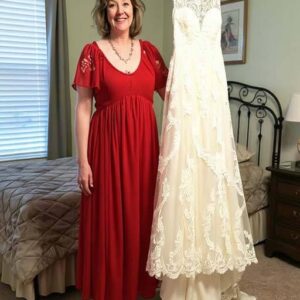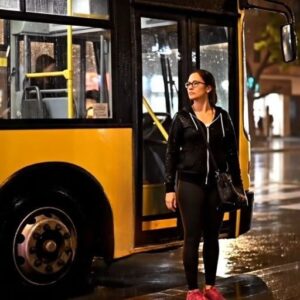
When we adopted Bobby, a quiet five-year-old boy, we believed that love and time would help him heal. However, on his sixth birthday, he shocked us with five words: “My parents are alive.” What followed uncovered truths we never expected.
I always assumed motherhood would come naturally and easily. But life had other plans.
When Bobby spoke those words, it wasn’t just his first sentence. It marked the start of a path that would challenge our love, our patience, and everything we thought about family.
I used to think everything in life was ideal. I had a caring husband, a warm home, and a stable job that allowed me to enjoy my hobbies.
But something was missing. A feeling that grew with every silent moment and every look at the unused second bedroom.
I longed for a child.
When Jacob and I decided to try for a baby, I felt hopeful. I imagined late-night feedings, messy art projects, and watching our child grow.
But months turned into years, and that vision never materialized.
We tried every method, from fertility treatments to consulting top specialists in town. Each attempt ended with the same words: “I’m sorry.”
The day everything fell apart is etched in my memory.
We had just left another fertility clinic. The doctor’s words echoed in my mind.
“There’s nothing more we can do,” he said. “Adoption could be your best option.”
I kept it together until we arrived home. As soon as I entered the living room, I collapsed onto the sofa, tears streaming down.
Jacob came over.
“Alicia, what’s wrong?” he asked urgently. “Please, talk to me.”
I shook my head, struggling to speak. “I don’t understand. Why is this happening? All I ever wanted was to be a mom, and now it might never happen.”
“It’s unfair. I feel that too,” he said, sitting beside me and holding me close. “But maybe there’s another path. Maybe we don’t have to give up.”
“You mean adoption?” My voice cracked with emotion as I looked at him. “Do you really think it’s the same? I don’t know if I can love a child who isn’t mine.”
Jacob’s hands gently held my face, and his eyes fixed on mine.
“Alicia, you have more love than most people. Being a parent isn’t about DNA. It’s about love. And you… you’re a mother in every way that counts.”
His words stayed with me over the next few days. I kept replaying our conversation whenever doubt crept in.
Could I really do this? Could I be the mother this child needs, even without biological ties?
Finally, one morning, as I watched Jacob sipping coffee at the kitchen table, I made a choice.
“I’m ready,” I whispered softly.
He looked up, hope shining in his eyes. “For what?”
“For adoption,” I declared.
“What?” Jacob’s face lit up with joy. “You have no idea how happy I am to hear that.”
“Hold on,” I said skeptically. “You’ve been thinking about this already, haven’t you?”
He chuckled.
“Maybe a little,” he admitted. “I’ve been looking into nearby foster homes. There’s one not far away. We could visit this weekend if you’re prepared.”
Let’s do this,” I agreed. “Let’s visit the foster home this weekend.”
The weekend came sooner than expected. As we drove toward the foster home, I stared out the window, nerves tight.
“What if they don’t like us?” I whispered.
“They will love us,” Jacob reassured, squeezing my hand. “And if they don’t, we’ll find a way.”
When we arrived, Mrs. Jones, a kind woman, greeted us at the door. She led us inside, talking about the place.
There were children playing, laughing, and talking.
As I looked around, my gaze landed on a little boy sitting quietly in the corner. He wasn’t playing, just watching everything.
His large eyes seemed full of thoughts, as if trying to understand if this was real or only temporary.
“Hi,” I said, kneeling beside him. “What’s your name?”
He stared at me without speaking.
Is he shy? I wondered.
“Does he not talk?” I asked Mrs. Jones.
“Oh, Bobby talks,” she said with a smile. “He’s just shy. Give him some time, and he’ll open up.”
I felt my heart ache for this quiet child.
“Nice to meet you, Bobby,” I said gently, even though he said nothing.
Later, in her office, Mrs. Jones told us more about him.
Bobby was left as a baby near another foster home with a note: His parents are dead, and I’m not ready to care for him.
“He’s been through more than most adults ever will,” she said softly. “But he’s sweet, clever, and needs someone who believes in him. Someone who will care and love him.”
At that moment, I knew I wanted him with us.
“We want him,” I told Jacob.
He nodded. “Absolutely.”
We signed the papers to bring Bobby into our home and felt hope again.
I hadn’t felt that in a long time. I knew there would be difficulties, but we were ready to love him completely.
And that was just the beginning.
When Bobby arrived, our lives changed dramatically.
From the start, we wanted him to feel secure and loved. We decorated his room brightly, filled with books and his favorite dinosaurs.
But Bobby stayed silent.
He watched everything with those thoughtful eyes, as if trying to see if this was real or just temporary.
Jacob and I poured our love into him, hoping he would open his heart.
“Do you want to help me bake cookies, Bobby?” I’d ask, lowering myself to his level.
He’d nod, grabbing cookie cutters with small hands, but never speaking a word.
Sometimes, Jacob took him to soccer practice and cheered from the sidelines.
“Great kick, buddy! You’ve got this!” he shouted.
But Bobby simply smiled faintly and kept quiet.
At night, I read him bedtime stories.
“Once upon a time,” I’d begin, peeking over the book to watch his face.
He always paid attention, yet he never spoke.
Days went by like this. We understood he needed time and didn’t pressure him.
Then, on his sixth birthday, Jacob and I organized a small celebration—just us and a cake decorated with tiny dinosaurs.
The moment he saw the cake, he smiled with wonder.
“Do you like it, Bobby?” Jacob asked.
He nodded and gave us a faint smile.
As we lit the candles and sang “Happy Birthday,” Bobby watched us deeply. When the song ended, he blew out the candles and spoke for the first time.
“My parents are alive,” he said softly.
Jacob and I stared, surprised.
“What did you say, sweetheart?” I asked, kneeling beside him.
He looked at me and repeated, “My parents are alive.”
I couldn’t believe my ears.
How could he know that? Was he remembering something? Did someone tell him?
My mind raced but Bobby stayed silent that night.
Later, as I tucked him into bed, he held his new stuffed dinosaur and whispered, “At the foster home, the adults said my real mom and dad didn’t want me. They’re not dead. They just gave me away.”
His words broke my heart and made me wonder about the foster house. Are his parents really alive? Why didn’t Mrs. Jones tell us this?
The next day, Jacob and I returned to Mrs. Jones to get answers.
When we told her what Bobby said, she looked uncomfortable.
“I… I didn’t want you to find out this way,” she admitted, nervously twisting her hands. “But he’s right. His parents are alive—they’re wealthy and didn’t want a child with health problems. They paid to keep it quiet. I didn’t agree, but I wasn’t in charge.”
“What health problems?” I asked urgently.
“He was ill when they abandoned him, but it was temporary,” she explained. “He’s fine now.”
“And the note story? Was it false?”
“Yes,” she admitted. “We made that story up because our boss told us to. I’m sorry.”
Her words felt like betrayal. How could someone leave their own child? For what? Because he wasn’t perfect?
When we got home, we explained everything carefully. But Bobby refused to accept it.
“I want to see them,” he said firmly, clutching his dinosaur.
Despite worries, we knew we had to respect his wish. We asked Mrs. Jones for their address.
At first, she refused. But when we explained how much Bobby wanted to meet them and that he was desperate, she changed her mind.
We took Bobby to his parents’ mansion. His eyes lit up as we arrived.
He clung tightly to my hand, nervous and eager.
Jacob knocked, and after a moment, a well-dressed couple appeared. Their faces fell when they saw Bobby.
“Can we help you?” the woman asked nervously.
“This is Bobby,” Jacob said softly. “Your son.”
They looked at Bobby with surprise.
“Are you my mommy and daddy?” he asked softly.
They looked at each other, embarrassed and uncomfortable, trying to explain.
“We thought,” the man began. “We believed we were doing the right thing. We couldn’t care for a sick child. We hoped someone else could give him a better life.”
I felt anger rise, but before I spoke, Bobby stepped forward.
“Why didn’t you keep me?” he asked directly, eyes fixed on his birth parents.
“We… we didn’t know how to help you,” the woman whispered.
Bobby frowned.
“I don’t think you even tried,” he said quietly.
Then he turned to me.
“Mommy,” he said. “I don’t want to go with the people who left me. I don’t like them. I want to stay with you and Daddy.”
Tears filled my eyes. I knelt beside him.
“You don’t have to go,” I said softly. “We’re your family now. We will never let you go.”
Jacob placed a gentle hand on Bobby’s shoulder.
“Yes, we’ll never leave you,” he promised.
The couple shifted uncomfortably, not saying a word.
As we left, I felt calm and content. Bobby had chosen us, and we had chosen him.
His choice showed me we weren’t just his foster parents. We were truly his family.
From then on, Bobby thrived. His smile grew brighter, and his laughter filled our home.
He began to trust us fully, sharing his thoughts, hopes, and fears.
Watching him grow, Jacob and I knew our family was complete.
He called us “Mommy” and “Daddy” proudly, and every time he did, it reminded me that love, not blood, creates a family.




